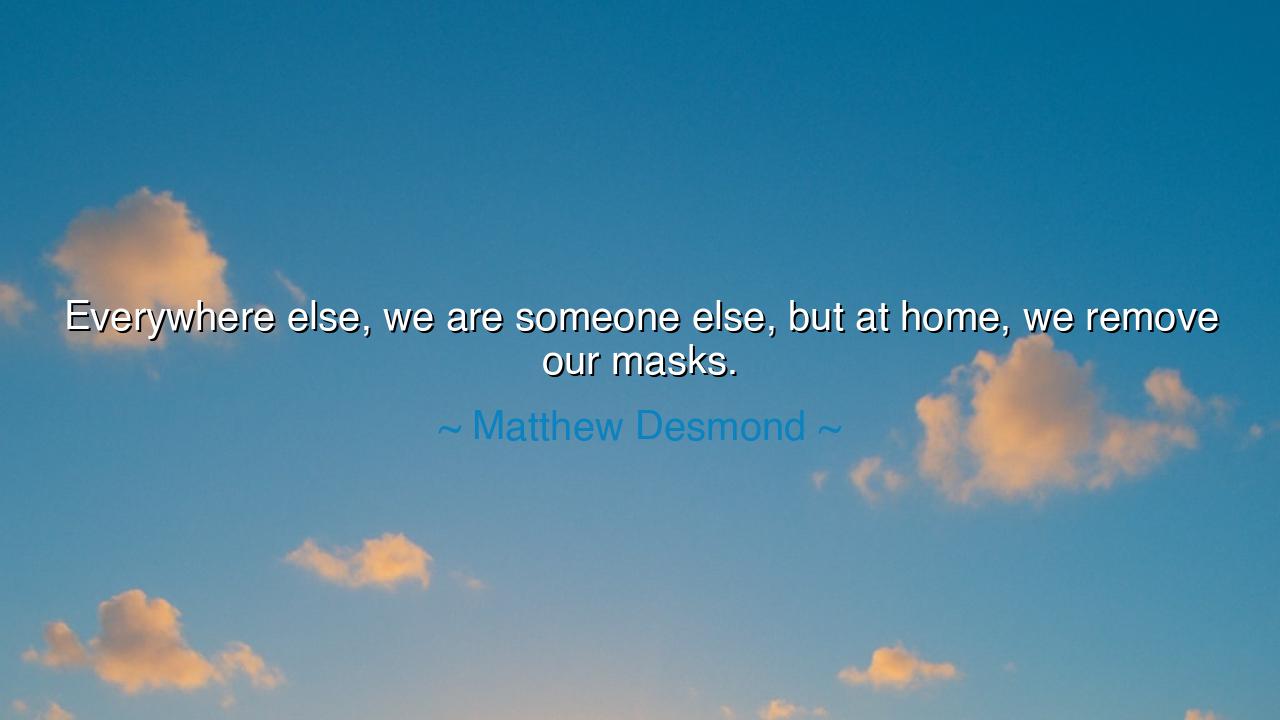
Everywhere else, we are someone else, but at home, we remove our






In the profound words of Matthew Desmond, “Everywhere else, we are someone else, but at home, we remove our masks,” lies a truth both tender and timeless. These words pierce through the illusions we wear before the world and call us back to our most authentic selves. In the marketplaces of life—in our work, in our friendships, in our ambitions—we wear masks of strength, competence, and calm. But at home, when the doors close and the lights dim, the performance ends. There, we become who we truly are: weary, flawed, unguarded, and real. Desmond, a chronicler of human struggle and social truth, reminds us that home is not merely a place of shelter, but the sacred realm where the soul is unmasked and allowed to breathe freely.
The meaning of this quote touches the core of what it means to be human. We live in a world that demands masks—masks of success, of confidence, of composure. We play roles to meet expectations, to earn love, to survive. Yet in doing so, we often forget the face beneath the mask. Home, in Desmond’s understanding, is the one refuge where we are seen not for what we do, but for who we are. It is where we shed the armor of pretense and reveal our vulnerabilities. To remove the mask is to return to the truth of the self—to the child within us who needs neither approval nor applause, only acceptance.
The origin of this wisdom flows from the ancient idea of sanctuary. In every civilization, from Greece to China, the home was considered the hearth of the heart, the space where the spirit found renewal after the battles of the day. The Romans worshiped the goddess Vesta, guardian of the household flame, believing that her fire represented the unity and sincerity of the family. They understood that society’s strength was born not in its temples or forums, but in the truthfulness of its homes. When we bring masks into that sacred space—when we perform even in front of those we love—we extinguish that fire. Desmond’s words call us to protect it, to keep it burning with the light of honesty.
We find this truth illustrated in the life of Abraham Lincoln, who bore the heaviest burdens of leadership during America’s darkest hour. To the world, he was the steadfast statesman, unyielding and wise. But in his home, among his family and friends, he laid down that mask. It is said that Lincoln’s heart broke open in the quiet of his home after the death of his young son, Willie. There, behind closed doors, the great leader became only a grieving father, stripped of pretense and power. In his vulnerability lay his true humanity—and perhaps it was this quiet honesty that gave him the strength to lead a wounded nation with compassion. His home, however humble, was the place where the man beneath the mask could still exist.
Yet Desmond’s reflection carries a shadow as well. For many, home is not the sanctuary it should be. Poverty, violence, and alienation turn what should be a refuge into a battlefield. Desmond’s work, especially in Evicted, shows how fragile the idea of home can be when it is torn apart by injustice. When one has no place to rest, to be unmasked, one is condemned to live always in disguise—performing strength, endurance, and hope without the solace of rest. Thus, his quote is both a statement of truth and a plea for empathy: to build a world where everyone may have a home in which to be themselves. A home, after all, is not walls and roof, but safety, belonging, and the freedom to be unguarded.
There is wisdom here for all who seek peace. In a world of endless comparison and expectation, the act of removing the mask becomes revolutionary. To live without pretense in one’s own home, and to offer that same grace to others, is to create an oasis of authenticity amid the deserts of performance. If the heart cannot rest in truth within its own walls, where then shall it rest? Therefore, make your home a place of honesty and acceptance, where neither pride nor shame need dwell. Speak truthfully, forgive quickly, love without condition. These are the bricks that build a dwelling of the soul.
And so, dear listener, let this be your lesson: cherish your home as the sacred space where masks are not needed. When you cross its threshold, lay down the armor of the day. Let your laughter be unpolished, your tears unhidden, your presence unfiltered. If you share that home with others, give them the same freedom—to be imperfect, to be human, to be whole. For in this simple act of truth lies the deepest form of love. Remember always that the world outside will demand a thousand faces from you, but home—true home—will always call for only one: your own.
Thus, as Matthew Desmond teaches us, home is not merely a dwelling—it is a mirror of the soul, a place where the heart can finally whisper, “I am myself again.” And in that whisper, we rediscover the ancient peace that the world has long forgotten.






AAdministratorAdministrator
Welcome, honored guests. Please leave a comment, we will respond soon